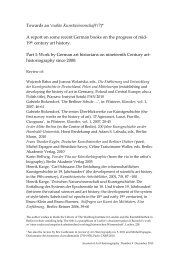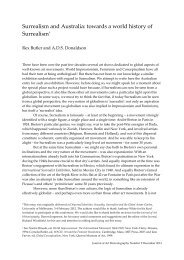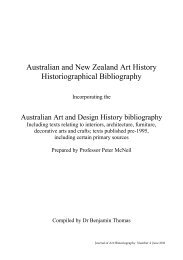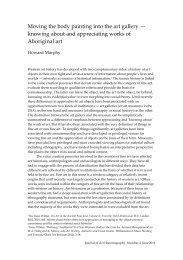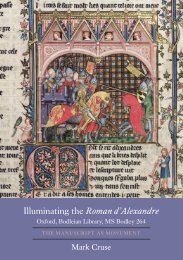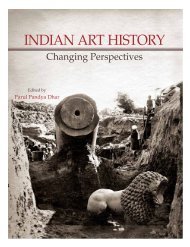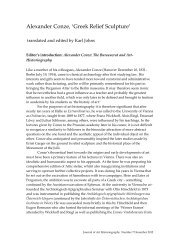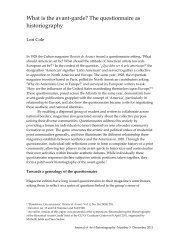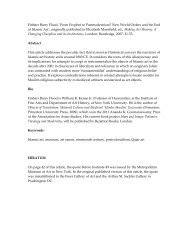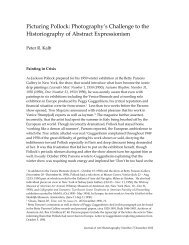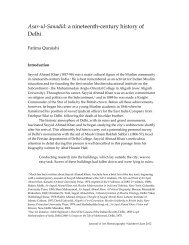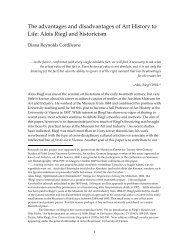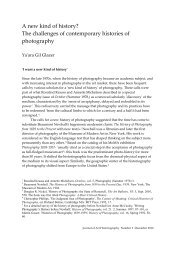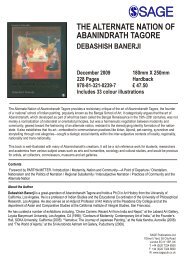9/CCG1 - Journal of Art Historiography
9/CCG1 - Journal of Art Historiography
9/CCG1 - Journal of Art Historiography
You also want an ePaper? Increase the reach of your titles
YUMPU automatically turns print PDFs into web optimized ePapers that Google loves.
Carolyn C. Guile<br />
Winckelmann in Poland: An Eighteenth-Century<br />
Response to the ‘History <strong>of</strong> the <strong>Art</strong> <strong>of</strong> Antiquity’<br />
resulted in the introduction <strong>of</strong> the subject to the Polish ‘nation’ (which by this point<br />
no longer existed) and constituted a real addition to Commonwealth literature. 86 It<br />
thus served as an artefact <strong>of</strong> culture that further aggrandized a long-standing and<br />
important European literary tradition. As a stated goal <strong>of</strong> the Society <strong>of</strong> the Friends<br />
<strong>of</strong> Learning had been ‘to save and perfect the mother tongue, keeping the memory<br />
<strong>of</strong> the history <strong>of</strong> the Polish nation’, 87 Potocki’s project was significant and <strong>of</strong> its time.<br />
Linking wartime destruction with Potocki’s goal to preserve his native culture,<br />
Staszic was compelled to mention that, ‘Poland had beautiful works <strong>of</strong> art. Of those,<br />
some by wars destroyed, others by misgovernment squandered. Only the Lord’s<br />
temples, the tombs <strong>of</strong> kings and heroes were spared.’ 88 From here emerged<br />
Potocki’s struggle, namely ‘to keep and protect at least this remainder <strong>of</strong> national<br />
souvenirs.’ 89 Staszic noted ironically that ‘during this time, being free from the<br />
duties <strong>of</strong> a citizen, he was <strong>of</strong>ten thinking about the depth <strong>of</strong> the damages and the<br />
contamination that the spirit <strong>of</strong> feudalism left on the hearts and minds <strong>of</strong> people.’ 90<br />
Preparations for a catalog <strong>of</strong> drawings <strong>of</strong> all Polish monuments, supervised by<br />
Potocki himself and executed by artists <strong>of</strong> his selection, were also underway but<br />
were never completed.<br />
Undoubtedly the political realities <strong>of</strong> the time as well as Potocki’s ideological<br />
convictions shape his approach to the legacy or fate <strong>of</strong> ‘the beautiful’ that is his first<br />
purpose; he is consistent in his approach to art. While he may have embraced a<br />
return to the ‘pure’ forms <strong>of</strong> classical Greek art, as Winckelmann had done, he had<br />
also stated that a return to simple beginnings or origins would be by nature false,<br />
regressive and even impossible. The problems <strong>of</strong> modern society, Potocki<br />
complained, were more easily criticized than corrected. Advocating in his<br />
introduction an examination <strong>of</strong> society ‘as it is, and not as it should be’, 91 he attacked<br />
what he called the source <strong>of</strong> opposition toward art and science. He identified that<br />
opposition as the desire <strong>of</strong> individuals to change the world around them for the<br />
sake <strong>of</strong> philosophical novelty, all performed under the guise <strong>of</strong> a solipsistic quest for<br />
personal happiness. Generally maligning the philosophes as hypocrites, Potocki<br />
declared that these thinkers, ‘hidden in a temple <strong>of</strong> evil…attacked the very sacred<br />
rules <strong>of</strong> society’ and only ‘ruined blossoming cities’ at the hand <strong>of</strong> their<br />
86 Staszic, Pochwała SKP, 55.<br />
87 ‘Pod rządem Pruskim Potocki był jednym z pierwszych założycieli Towarszystwa przyjaciół nauk,<br />
ktorego głównym zamiarem było ocalenie i doskonalenie oyczystey mowy, zachowanie i<br />
udokładnienie dziejow narodowych.’ Staszic, Pochwała SKP, 34.<br />
88 ‘Miała o [sic!] Polska pięknych kunsztow u siebie twory. Z tych iedne wojen [?] stały się, drugie<br />
nierządu przypadkami roztrwonione i znisczone zaginęły; Uszły tego losu Swiątynie pańskie, groby<br />
królow, i sławnych wojownikow.’ Staszic, Pochwała SKP, 56.<br />
89 Staszic, Pochwała SKP, 56.<br />
90 ‘Usiłowaniem Potockiego było zachować od zatracenia przynaimniei tę resztę pamiątek<br />
narodowych.’ Staszic, Pochwała SKP, 56.<br />
91 ‘Patrzymy więc na świat i ludzi, jakiemi są, nie jakiemi być by powinni…’ Potocki, O Sztuce u<br />
Dawnych, 1: 8.<br />
23



